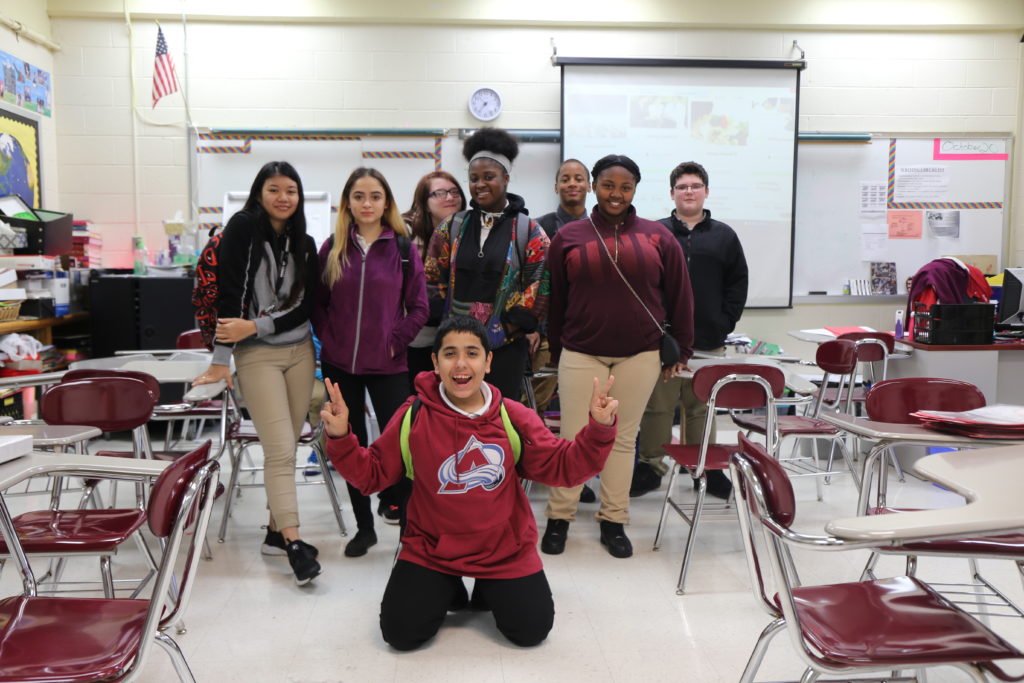
Rather than just asking kids what they want to be when they grow up, Nashville’s public schools are experimenting with a new test developed by a local company to help students figure out what they’re naturally good at. Metro Schools have already made a big push to get students thinking about careers early on — this is the next step in also helping them find the right fit.
At the district’s twelve biggest high schools, freshmen enroll in
career focused
academies divided into fields like healthcare, business and the arts.
Most students in Ms. Long’s class at Maplewood High School are just 14-years-old. But they’re already considering careers they think would be fun.
A survey around the room reveals aspiring dentists, biochemists, lawyers, dermatologists and artists.
Each November, they participate in a city-wide career fair put on by the Nashville Area Chamber of Commerce. Organizers noticed many of the students gravitate towards the flashiest booths or those with traditional professions they know, like teaching or business.
Marc Hill, the chamber’s chief policy officer, says they decided to do something different.
“We wanted to help the students move beyond what they think are their interests and help them discover what their aptitudes and talents are,” Hill says.
There are
mixed feelings about the accuracy — and need — for aptitude tests. But the U.S. military has been using them for decades.
They might also help funnel more women and minorities into careers that have traditionally been dominated by white men, like technology and manufacturing. Studies conducted by a Nashville-based tech startup called YouScience found that most had the necessary skills but a much smaller number expressed an interest.
“Regardless of race or gender, these students have the aptitude for these high demand, high growth jobs yet they don’t know that,” says Armando Garza, vice president of marketing with YouScience. “And that highlights the exposure gap.”
Garza explains the reason for the lack of interest stems simply from the fact that many women and minorities often are often not exposed to certain professions.
He says measuring aptitude can also prove that every student has something they can excel at.
“Schools use GPA, ACT and SAT as a proxy for talent,” Garza says. “What ends up happening is the top 10% are recognized, yet the other 300-500 students in auditorium also have talent and the economy needs them.”
Metro Schools are now having
freshmen use the
YouScience software. The Chamber of Commerce underwrote the $30,000 cost this year to purchase licenses for approximately 4,000 students. It’s a pilot program — if Metro wants to keep it next year, the district will have to make room in the budget.
https://www.youtube.com/watch?v=zDizRwoXUOE
YouScience merges aptitude and interest-based assessments into timed game-like exercises — asking students to do things like describe abstract shapes, free write on a given topic and spot the difference in sequences of letters and numbers. There are no right or wrong answers. After the 75-minute exam, which is completely online, students wait a day for it to be graded.
Back at Maplewood High School, the students have just received their results.
Their identified skills have been run through a U.S. Department of Labor career database* which matches them to jobs, from geologist to paralegal. Careers are broken down by how much education will be needed, salary and even job prospects per state. There are three different lists: careers based on natural aptitudes, interests, or those that combine both.
“This is so surprising,” says Sofia Lardmuang as she logs into the website to view her scores. “Middle school teacher? I do not like this.”
She says she wants to be an artist and that the test just doesn’t “get her.”
Across the classroom, Noah Hurt is also reviewing his scores. He is interested in medicine. And his results reflect that —
physician, veterinarian, orthodontist, and nuclear medicine technologist.
There’s a quiet kid in the back of the classroom named Mosaad Jawish. He says he doesn’t know what he wants to do. He just wants a job that makes good money, something in tech or maybe a mechanic. His top recommendations all have him managing a team.
That’s a revelation for him.
He says that probably means he’s a decent leader. He didn’t know that.
Feedback like this could be helpful immediately to his teacher Michelle Scott Long. She says she’ll try to get him to break out of his shell, maybe by implementing more group activities.
I
dentifying aptitude early could make a huge difference. And Long would know. After spending time in the military and then twenty years in finance she found herself unfulfilled.
She says she asked herself “what do I want do?”
She thought of her love of history and the satisfaction she’d felt when she’d tutored once in the past.
“I went back to school and did a full teacher certification for history and geography and loved it ever since,” Long says.
She hopes that the new aptitude tests can save her students from wandering like she did.
Editor’s Note: A previous version of this article said the career database was also used by the U.S. military, but it is fact only for civilian careers.


